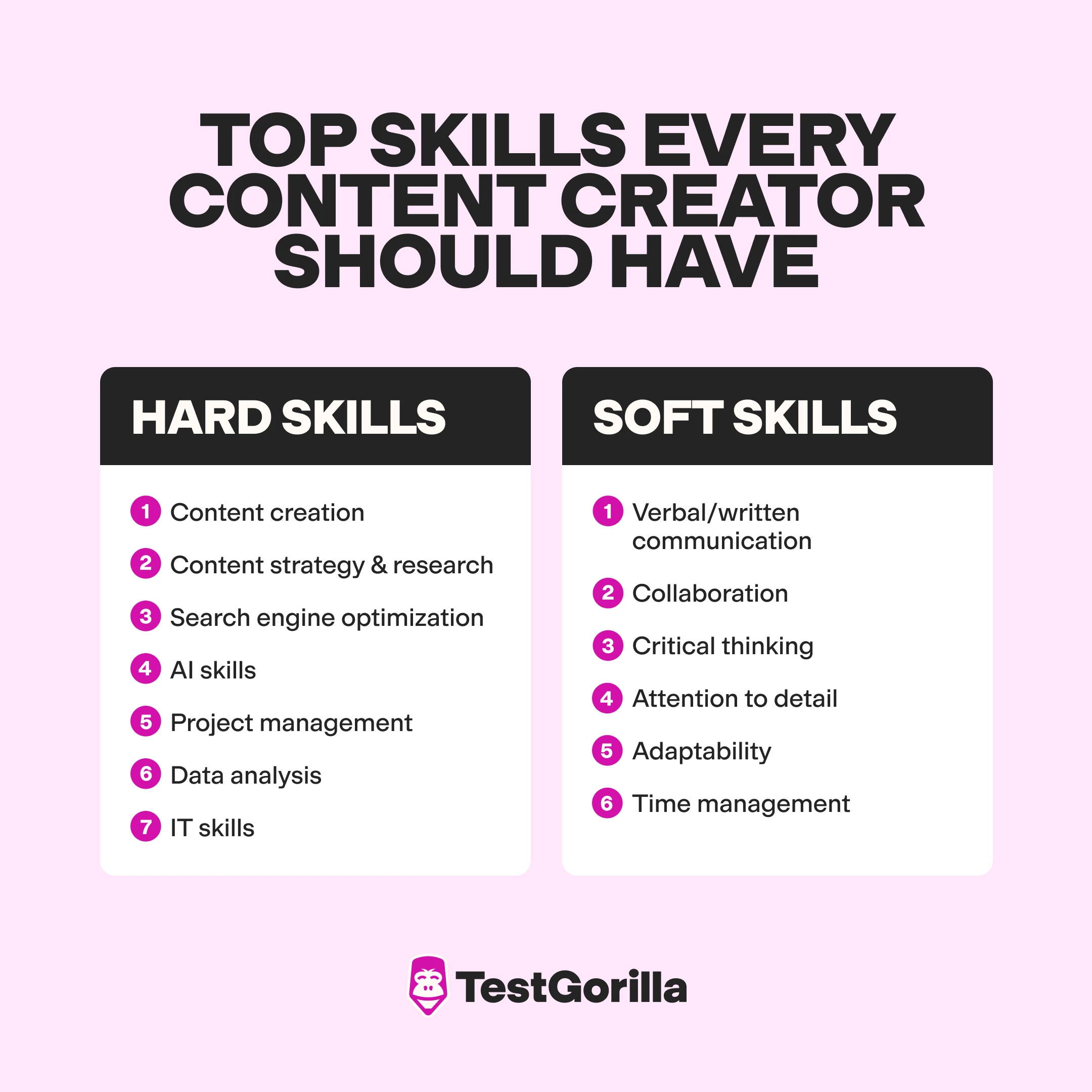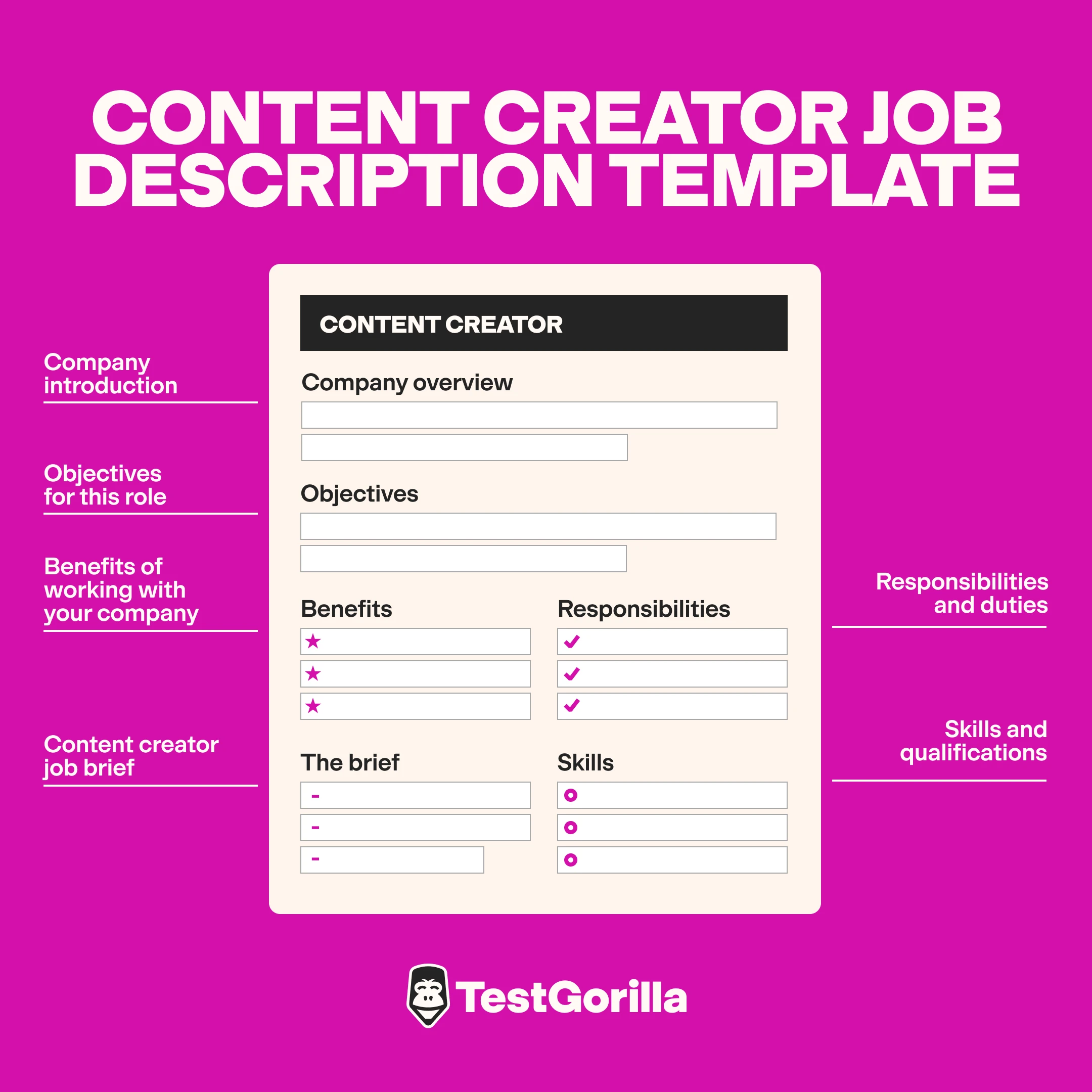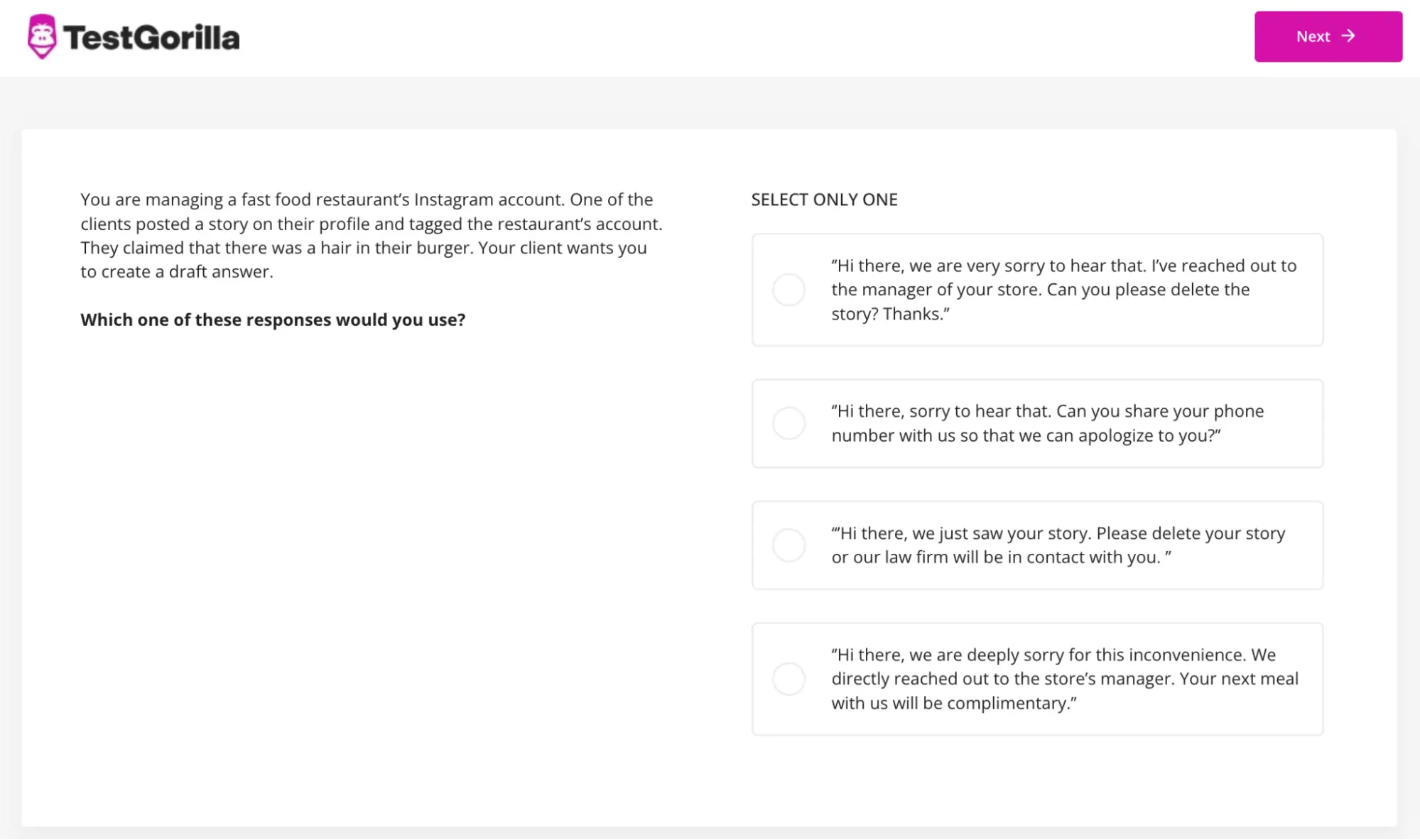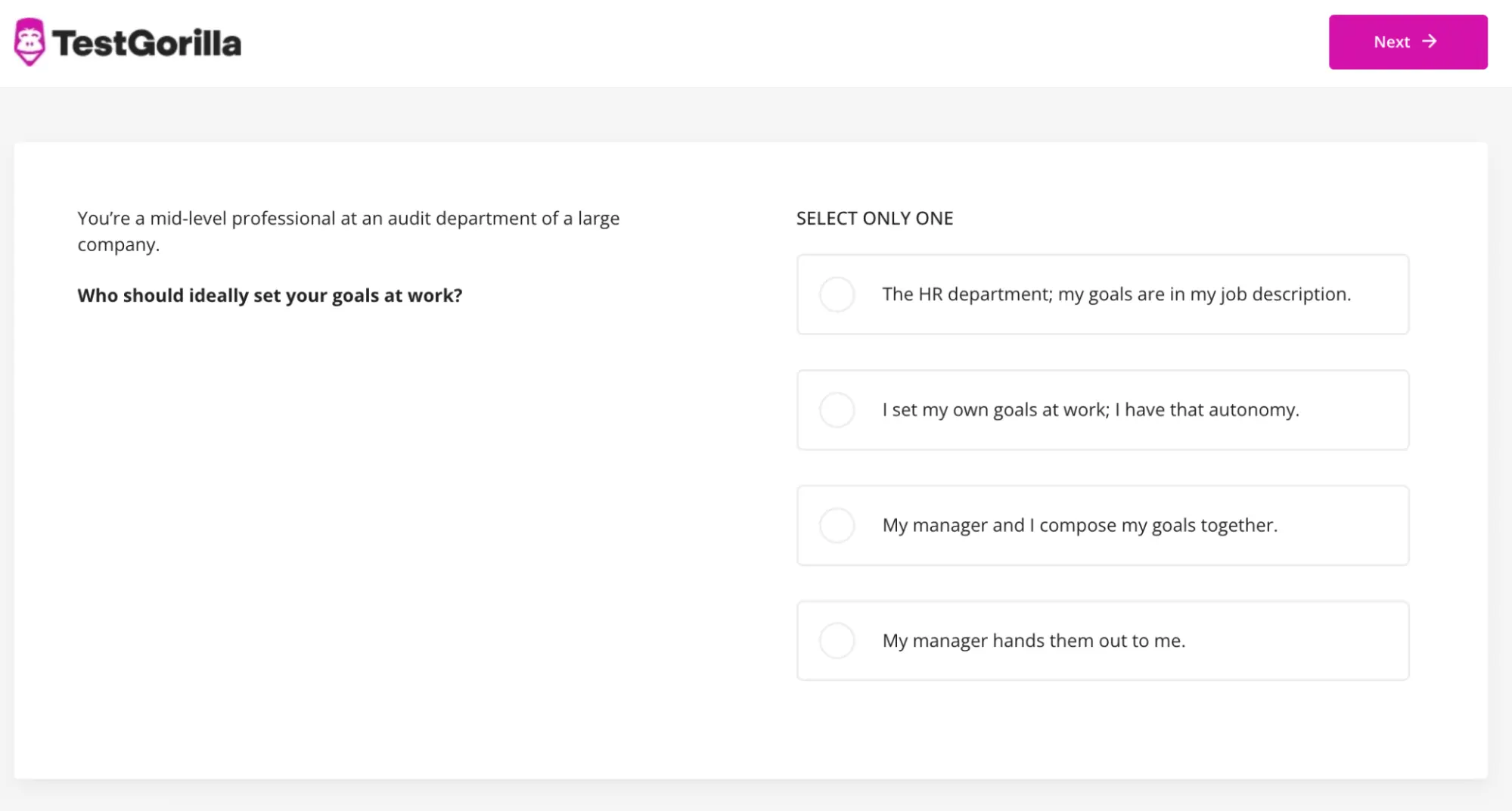Evaluate your content creator candidates with skills-based testing
The role of content creators is advancing alongside ever-evolving digital marketing strategies and technologies. Today, companies hire content creators specializing in everything from social media content creation to copywriting to videography.
According to The Economic Times, demand for content expertise has increased by 117% in recent years, generating significant competition for top talent. This makes writing an effective creative content creator job description essential, especially if you’re after a variety of content creator skill sets.
This guide (and template) shows you how to attract content experts and find the perfect hire by taking a skills-first approach.
Table of contents
What is a content creator?
Content creators are specialists at producing engaging, relevant, and impactful content. They supply businesses with written, graphical, audio, and video content designed to educate, inspire, and convert customers.
Content production is a diverse field where professionals are often distinguished by specialty. For example, companies can hire specialist content writers for each aspect of their marketing strategy, such as social media content experts, or choose multi-skilled candidates.
Common types of content creators include:
Search engine content creator: Creates content for search engine marketing, PPC campaigns, and search engine optimization
Social media content creator: Produces content for social media posts and promotional material on platforms such as LinkedIn, Facebook, and Instagram
Video content creator: Specializes in video production for various channels, such as YouTube, TikTok, and company websites
Audio content creator: Develops scripts and content for podcasts, radio shows, and other auditory mediums
Email content creator: Works with email marketing experts to produce email sequences, newsletters, and campaigns
The type of content creator you’re hiring influences what you include in a job description and your interviewing strategy. If you’re writing a social media content creator job description, for instance, your job description might outline which websites your employee will create content for – so in your interview, you’d want to ask questions related to social media management.
13 top skills to look for in content creators
Knowing the type of content creator you’re recruiting determines which competencies you need to prioritize for a skills-based hiring approach.
Here are the key hard and soft skills that form a baseline for any content creator, regardless of the medium they specialize in.
Content creator hard skills
Hard skill | Description |
Content creation | They’re able to produce engaging, high-quality content for relevant formats (written, audio, or visual) |
Content strategy & research | Content creators know how to research trends, customer profiles, and competitors and design data-driven content strategies |
Search engine optimization (SEO) | They’re familiar with SEO best practices, using internal and external linking, keyword research, and SEO tools to improve results |
AI skills | They have experience with generative AI tools like Midjourney, ChatGPT, and Jasper in content production |
Project management | Content creators are experts in managing resources, analyzing progress, delegating and prioritizing tasks, and reporting progress |
Data analysis | They can use analytical tools to track metrics like audience engagement, website traffic, and content reach |
IT skills | They’re confident with Microsoft 365, Google Workspace, social media tools, content management systems, and email automation software |
Content creator soft skills
Soft skill | Description |
Verbal/written communication | Content creators can communicate complex concepts with colleagues and customers vocally or in writing |
Collaboration | They have experience working with teams of editors, designers, product managers, marketing managers, and executives |
Critical thinking | They can identify ways to improve content performance through research |
Attention to detail | Content creators are experts in proofreading content or spotting other errors to preserve brand reputation and make content authoritative |
Adaptability | They’re quick to learn new content production mediums, tools, and audience preferences |
Time management | They can prioritize tasks based on impending deadlines and campaign requirements |
Hire highly skilled content creators
Skills tests help you discover talented content creators objectively and bias-free. Book a live demo, and one of our friendly experts will show you how to get started.
The best insights on HR and recruitment, delivered to your inbox.
Biweekly updates. No spam. Unsubscribe any time.
How to write a compelling content creator job description: 3 tips
Before we move on to our content creator job description template, let’s cover three best practice tips for success. These tips apply to hiring all forms of content creators, from social media experts to videographers.
1. Define your content creation needs
Content creation is a multi-faceted landscape. Before writing your job description, identify your content creation needs by evaluating your current marketing strategy and business goals to narrow down what type of content expertise you need.
Examine:
Your current content strategy: If you’re currently using content marketing, which types of content generate the best results? Use Google Analytics and social media analysis tools to track the ROI of your content efforts.
Your competitors: Where are the gaps in your content strategy compared with your competitors? Do they attract and engage customers using video while you only use blog posts and social media?
Your target audience: How do your target customers prefer to consume content? For instance, 84% of B2B marketers believe video is crucial to their content strategy.
Based on your analysis, determine the key responsibilities of your ideal content creator. What technical skills are relevant to the type of media they’ll be producing? Videographers may need to be familiar with tools like Adobe Premiere, while search engine content creators typically use tools like Ahrefs and SEMRush.
2. Be clear about content goals and expectations
Clearly outlining goals and expectations is crucial for both employers and employees. Identifying content goals ensures employers can effectively measure employee performance.
If you want your social media content creator to increase brand recognition, tell them exactly what metrics and KPIs you’re monitoring – in this case, social engagement, website traffic, and brand mentions.
Clearly defined content creator job requirements also help candidates identify whether they have the skills to thrive in a role. They can quickly determine whether they have the experience and credentials to help you achieve your goals.
Also, offer insights into how you support employees in achieving their goals, such as providing training sessions and support from mentors. Many modern job seekers prioritize employee training and development opportunities like this, so speaking to them can make your job post stand out.
3. Appeal to the priorities of candidates
The content creation market is growing at a compound annual growth rate of 13.5%, and as demand for content experts increases, so does competition for talent. To attract the attention of the best candidates, you need a compelling employer value proposition.
To achieve this, be sure to set out the benefits of working with your company in your social, video, or digital content creator job description. Focus on:
Company culture: Explain your team dynamics, focus on diversity, equity, inclusion, and commitment to supporting your employees, and clarify that you look for culture add when hiring team members
Flexibility: Offer content creators access to remote and hybrid work and let them customize their schedules
Development opportunities: Show candidates how they can build new skills in your business with mentorship programs, training courses, and workshops
Innovation: Show a commitment to innovation by listing the cutting-edge tools content creators can access
Content creator job description template
Here’s a content creator job description template you can use to standardize the hiring process.
You can adapt this skills-based template for a freelance content creator job description, video content creator job description, or any other content worker.
Company introduction
Briefly introduce your company, sharing its name, industry, vision, mission, and the products or services you sell. Mention goals specific to content production and how content creators contribute to the business's growth. Discuss what makes your business different by mentioning awards, innovative marketing strategies, or unique team dynamics.
Example:
[Company X] is an innovative [niche] organization focused on [mission, values, vision]. We’re looking for a content creator who can help with [specific tasks and responsibilities] to assist us in achieving our [business goals].
Objectives for this role
Outline content creator job requirements, focusing on the targets the employee will work towards:
Increase web traffic with search engine optimization
Develop [company name’s] online presence across [marketing channels]
Enhance customer engagement on [social media channels]
Report on [marketing metrics] monthly
Reach new audiences through [marketing strategies]
Benefits of working with your company
Describe the benefits of working with your company, such as flexible work, learning and development opportunities, and a competitive salary.
Example:
[Company X] seeks a content creator to work remotely with our team. The ideal candidate will have access to our full suite of marketing resources, including generative AI software and a graphic design team. When working with [company] on our marketing strategy, candidates will learn new skills and receive financial bonuses based on performance.
Content creator job brief
[Company name]
Job title: [Digital Content Creator]
Reports to: [Chief Marketing Officer]
Position type: [Full-time, part-time, or contract]
Location: [Remote, hybrid, or on-site]
[Salary and benefits information]
Responsibilities and duties
Outline essential content creator responsibilities, which might include:
Research relevant topics for content production
Create various types of content (articles, videos, infographics), adhering to [company] editorial guidelines
Work closely with the marketing team to fulfill the content strategy
Utilize digital publishing platforms, such as [WordPress/social media platforms]
Conduct keyword research using [software]
Analyze content performance based on [metrics]
Maintain content calendars and schedules
Conduct competitor and audience research
Skills and qualifications
Outline key content creator skills and qualifications, breaking them down into required and preferred sections, like so:
Required skills and experience
Excellent writing and editing skills
Experience uploading content to [WordPress, Shopify, Wix]
Stellar written and verbal communication skills
Time and project management skills
Proficiency with Microsoft Office Suite
Fluency in written and spoken English
Expertise with social media marketing platforms
Video/image/audio editing expertise
Preferred skills and experience
Basic HTML/CSS skills
Proven work experience as a content creator or copywriter
Portfolio of published articles/content
Training in SEO tactics
Bachelor’s degree/master’s degree in an English- or Comms-related field
Next steps: Attract and assess content creators with TestGorilla
Now that you have a comprehensive content creator job description, it’s time to ensure you’re hiring the right talent.
When applications begin pouring in, don’t rely on resumes to help you filter your options.
Talent assessments ensure you take a skills-based approach to hiring, improving your chances of recruiting the right team members and boosting your screening efficiency beyond what you ever thought possible.
With TestGorilla, you can measure a candidate’s skills on multiple levels. You can start by examining content creation specialty skills: Our test library includes assessments for social media content creation, digital content creation, and video creation.
You can also explore skills for specific content platforms. Our Instagram Marketing test assesses candidate knowledge of account features, content and strategy methods, marketing metrics, and reporting.
You should then evaluate the soft skills crucial to a content creator role – for instance, the Time Management test evaluates how well your employee can manage deadlines and juggle diverse content calendars.
After narrowing down your options with talent assessments, be sure to ask the right questions in the interview process to focus on the candidate’s skills. For inspiration, check out our list of content strategist interview questions.
Alternatively, you can refine your candidate pool further before the interview process, using personality and cultural fit tests, like our Culture Add test. This helps you define how well new candidates can contribute to your company culture.
Our talent assessments boost your chances of finding the top candidates instantly, reducing hiring costs and costly recruitment mistakes.
For example, Redfish used TestGorilla to ensure it chose the right people for its video content creation teams, evaluating everything from skills in pay-per-click ads to content strategy. This has helped Redfish greatly minimize errors in its hiring process.
Use TestGorilla to unlock the power of talent assessments.
Getting started is quick, easy, and 100% free. Just sign up, and you can start browsing through content creator assessments.
Create a powerful content creator job description today
Content is critical to your company’s marketing and branding. A compelling content creator job description ensures you find people skilled at communicating with clients.
Whether you're writing a content creator assistant job description or searching for a niche content writer, our job post template helps you attract and engage with the right job seekers.
Once you start receiving applications, make sure you assess what matters – skills, personality, and culture – with TestGorilla.
Sign up for our Free forever plan for unlimited access to essential soft skill tests for content creators, such as communication, problem-solving, and time management tests.
Or look at our product tour for insights into more specific content creator tests.
Content Creator Job Description FAQs
Below, we’ve answered some common questions about content creators.
What are the roles of a content creator?
A content creator’s roles can include writing, editing, blogging, and updating content for websites, social media channels, email campaigns, and marketing strategies. Their overall goal is to create entertaining, instructional, and engaging content.
What skills do you need to be a content creator?
Research and analysis
Writing and editing
Communication and collaboration
Design and visualization
Search engine optimization
Social media management
What is the salary of a content creator?
The average content creator job salary in the US in 2024 was $79,978 per year. This salary varies depending on experience, responsibilities, and the nature of the role (freelance, contract, in-house).
You've scrolled this far
Why not try TestGorilla for free, and see what happens when you put skills first.





















